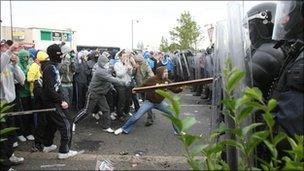Northern Ireland's grand plan to tackle sectarianism
- Published

The number of 'peace walls' in Belfast has trebled since the first IRA ceasefire
As the Northern Ireland Executive publishes a landmark strategy on healing divisions and fighting sectarianism, BBC News Online asks why - after years of relative peace - some believe the document is more necessary than ever.
It is almost 16 years since the first IRA ceasefire.
When, a few weeks later, loyalists also laid down their weapons, one Belfast newspaper carried a trio of words in a banner headline - "Peace At Last".
It was intended as an exhalation of relief on behalf of most of the wider population rather than a glib expectation that a conflict so bitter and bloody could be resolved within a short timeframe.
Nevertheless, even the most pessimistic reader may have had some hope that eventually relations between the extremes of the community would be better than they have proven to be.
Now, even the most optimistic has to admit that the same suspicion and hatred that fostered the Northern Ireland Troubles in the first place still infests swathes of its communities.
The evidence is incontrovertible.
When BBC reporter Barbara Collins went to the Highfield estate in Belfast this week, she spoke to community workers to gauge the feelings of people in the wake of recent sectarian trouble nearby.
She discovered a brutal starkness.
Romanticised
Rather than a longing that the daily bombings and shootings remain largely a thing of the past, some young people in the loyalist enclave - many not even born in 1994 - have an appetite for something completely different.
"We are continually hearing from some young people that they feel they have lost out on something by not being heavily involved in the conflict," community worker Isaac Andrews said.
"We hear them saying that they wished they had been in jail.
"It is because of all the conversations they have grown up with in their communities - the romanticised versions, the myths about the past. What they are not hearing is what it was actually like to live in jail."
Isaac Andrews is one of many people in Northern Ireland who believes that some sections of society in Northern Ireland are more sectarian than they were in times 20 years ago when barely a day passed without a Troubles-related funeral.
After a conflict widely regarded as being without a winner, some seem to believe that to move towards the middle ground will see "their community" lose the peace.
Such attitudes have led the chief office in the Northern Ireland government to issue its strategy for a win-win society.
"Cohesion, Sharing and Integration", external has at its heart a principle - "A Shared Future".
'Surrounded'
Some have argued that its starting point should be to engender the notion among people that rather than living in one of two separate communities, they are part of one community with different backgrounds that is broken and can be healed.
That would be a long process.

Children as young as 8 were said to have been involved in rioting in north Belfast earlier this month
The number of "peace walls" - errantly named barriers that divide nationalist areas from loyalist areas and prevent sectarian disorder - has trebled in Belfast since 1994.
And people in enclaves like Highfield or the nationalist Short Strand still talk of being "surrounded" - not in the sense of living next to neighbours but in the same way General Custer talked about being surrounded by Indians.
Another Highfield community worker, Billy McQuiston, sums up the difficulty.
"When we have asked the community, they say yes - it is their intention to take them down at some stage but they do not want them down at the minute.
"When you start talking to people about shared space and a shared future generally, there are people who are prepared to move forward, but there are other people with very long memories.
"It is hard to move people along at the same pace."
Targets
Flickers of improvement - people starting to use the same supermarkets or GP surgeries in a way they did not a generation ago - are not happening at a quick enough pace, prompting the NI government to act.
But can a weighty tome filled with good intentions actually see the necessarily radical policies proposed and executed?
That is uncertain, according to Dr Peter Shirlow from Queen's University who has spent years studying the segregated communities of Northern Ireland.
"There is a recognition there at least that there are problems. What it does not do is tell us how things are going to look in 30 or 40 years time. What are the targets?
"Are they merely aspirational or are they really forcing people to work and to share and to think about things in different ways?
"We have to have targets - by 2015, we want to see this, by 2020, we want to see that.
"It is has to be not just ambition but reality."